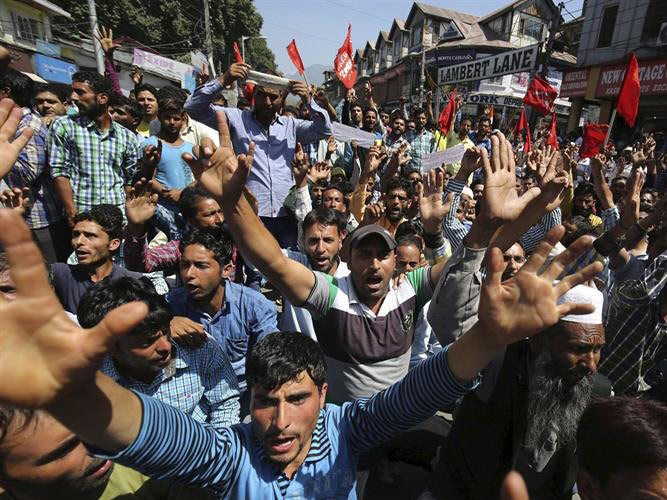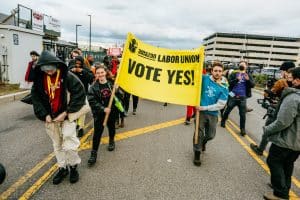Over 150 million workers went on strike last week in protest against Prime Minister Narendra Modi’s labor reform in India’s largest labor stoppage since 1991. The strike was felt across the country, with special strength in Kolkata, Kerala and West Bengal. Banking, coal and transportation –including taxis and rickshaws– were the most severely affected sectors. Port and steel sectors saw major disruptions and gas plants were shut down all over the country, affecting domestic and industrial supply.
Among the big unions, only Bharatiya Mazdoor Sangh (BMS) withdrew from the strike on the eve of the claiming that the government had already given enough concessions to labor. BMS, the ‘labor wing’ of the conservative nationalist organization Rashtriya Swayamsevak Sangh (RSS), is allegedly the largest national union in India with over 10 million individual members.
The protests were peaceful for the most part, although skirmishes took place in some cities with militant left traditions such as Kerala, Kashmir, Karnataka and West Bengal — where 200 protesters were arrested. The general strike was called by 10 out of the 12 trade union federations to protest against labor reform and the privatization of public assets. Prime Minister and leader of the Bharatiya Janata Party (BJP) Narendra Modi has made these two changes a central piece of his economic strategy to attract foreign investment.
Several economists, as well as the World Bank and the British pro-finance outlet The Economist, have emphasized the need for India to reform its antiquated and cumbersome labor laws, if she wants to take on the lead as emerging economy. An additional problem is that labor regulations vary from state to state, further precluding the possibility of a common market of all India. The recipe from these capital’s pundits is something we unfortunately know very well: liberalization of the economy, flexibilization of the labor market, repeal of taxes, privatization of public assets and more.
The response from unions came right away. The Centre of Indian Trade Unions, a Communist Party of India (Marxist)-affiliated union, released a 12 points charter of demands which includes universal social security for all workers, a more fluent process for union recognition, control of prices, unemployment policies and a Rs 15,000 minimum wage. Modi’s law, in contrasts, proposes a Rs 7,000 minimum wage.
The proposed labor laws reform would also make hiring and firing easier for employers, allowing for scaling down in economic downturns, a way to have workers pay for the cyclical, inevitable crises of the economy. For example, companies employing over 100 workers need the approval of the Indian government to lay off workers. Modi is trying to shift the threshold to 300 workers. At the same time, the new bill would make it harder for workers to unionize and to go on strike.
A long term trend
Interviewed by Left Voice, Smriti Upadhyay, a PhD student in Sociology at Johns Hopkins and researcher on Labor in India offered a closer look at Indian industrial relations: “Liberalization in India formally began in 1991 with the New Economic Policy, ushered in by the Congress government. The BJP furthered the liberalization that the Congress started throughout the 1990s.”
She also points out that “liberalization was spotty: it entailed privatization, loosening investment restrictions, opening up the Indian economy (but much slower than other countries), but [the] state could not touch labor laws until Modi came into power–this fact is often celebrated as a show of force of organized labor by the left or voices more sympathetic to the left but it drew ire and criticism from the global business community.”
The shift to precarious labor took an erratic path in India. “Instead of formally reforming labor laws, throughout the 1990s the organization of production was transformed in a way that made exploitation of workers easier (for example large scale factories were split up into smaller-scale industrial units that could evade labor legislation).” In the words of a columnist for the Indian Express, the BJP government wants to make what is de facto into de jure through a total overhaul of labour relations.
As happened in other parts of the globe, precarious jobs became the preferred hiring modality among companies. “While there has been growth in Indian industry and in industrial employment since liberalization, this increase has come entirely from the growth of the informal workforce. This means that any expansion in additional employment has been of poor quality and precarious in nature.” says Smriti Upadhyay. “Informalization has always been rampant in India (the vast majority of the workforce has always been informal–i.e. the size of informal labor is not a post-liberalization consequence), but today we are seeing a growing pervasiveness of informal labor, even in the factory sector.”
A Pro-business Agenda in an Emerging Economy
Narendra Modi won by a landslide in May 2014 elections. The pervasive corruption of the National Congress Party and the lingering economic downturn paved the way for his victory. The strength of his campaign, though, was given by the economic growth of Gujarat, state where he governed for 12 years. Being his economic model one favorable to companies’ profits, the outright attack to workers rights is far from surprising.
In face of the increasingly evident limitations to economic growth in China and the stumbling economies of Russia, Brazil and South Africa, global capital turns its eyes to India– the most likely successor as preferred niche of capitalist accumulation and large scale salaried exploitation. The unprecedented slump in oil prices benefited the Indian economy and boosted its industry, the oil of which is four-fifths imported oil. This may have contributed to maintaining a relatively high GDP growth rate (7.5%). Counting on a labor force of 480 million people and an estimated annual growth of the Economically Active Population of 10 million for the next 4 decades, India’s labor market is expected to outgrow the Chinese within 10-15 years.
The manufacturing sector represents currently only 16% of the Indian GDP, while it makes up 32% of GDP in China. The liberalization of the labor market is aimed to change this. The explicit goal is to attract foreign investments, and there is only one way to do it: offering cheap labor and stripping workers of their rights.
However, the national government comes from a setback in Congress, after oppositional parties managed to reject an anti-farmer land reform. This was possible because the BJP has a majority in the lower house (Lok Sabha), but not in the higher house (Rajya Sabha). The law was meant, among other things, to make it easier for businesses to buy farmers’ land.
The general strike seems to show that the labor reform could follow the same path. Smriti Upadhyay however, is more cautious: “I would say that while the general strike last week is something to celebrate, there is a huge obstacle in uniting workers across formal-informal divisions. I think there have been some forward steps within the labor movement along this regards, but the work is by no means complete.”
If anything, last week’s massive show of forces could signify a major obstacle for Modi’s pro-business agenda. Winning the battle against Modi’s pro-business labor reform could help bring formal and informal labor together, strengthening ties within the labor movement and growing its power to mobilize.
Tags: India, Narendra Modi, General Strike, Labor Movement











